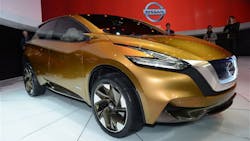Nissan Caps Buoyant Earnings for Japanese Auto Giants
TOKYO - Nissan (IW 1000/31) said Monday its nine-month net profit jumped 18.4%, capping a buoyant earnings season for Japan's top three automakers thanks to a cheap yen and rising sales in North America and China.
Rival Toyota (IW 1000/8), the world's biggest automaker, last week forecast a record annual profit with nine-month earnings more than doubling to $15 billion, after Japan's No. 3 Honda (IW 1000/29) said its earnings surged nearly 40%.
The trio has been big winners over the past year as a sharp drop in the yen inflated exporters' repatriated profits, further boosted by improved demand in key overseas markets.
Sales in China slumped in late 2012 and into last year as a Tokyo-Beijing diplomatic row sparked a consumer boycott of Japanese brands in the world's biggest vehicle market.
Relations remain tense, but Japanese manufacturers have reported sales are returning to pre-dispute levels.
Nissan was particularly vulnerable as it counts on China for about a quarter of its sales and has been fighting off rivals, including General Motors (IW 500/5) and Volkswagen (IW 1000/7), to return to its pre-boycott 7.7% market share.
In November, the new executive in charge of Nissan's China business said the firm was struggling to catch up with rebounding demand, after a slow start in the first half of 2013.
The maker of the Altima sedan and luxury Infiniti brand has three plants in China with a local partner, and plans to open another factory this year.
On Monday, Nissan said its net profit was 274.1 billion (US $2.68 billion) in the April to December period, up 18.4%, as profit in just the third quarter soared 57%.
Global revenue of 7.27 trillion yen was up 19.7% from a year earlier as Nissan pointed to a recovery in China as well as robust demand in Japan and North America.
'Sluggish Conditions' in Europe
However, sales of 3.67 million vehicles were up just 1%, as Nissan trailed its key Japanese rivals. Its Europe market struggled while Latin America and other parts of Asia turned down.
"Sales in Japan and North America helped offset emerging market volatility and sluggish conditions in Europe," said the company's chief executive Carlos Ghosn.
In November, Nissan downgraded its fiscal full-year profit outlook to 355 billion yen from 420 billion yen as higher-than-expected costs tied to vehicle recalls weighed on its bottom line.
The firm has announced a management shake-up on the heels of a broad restructuring at Renault (IW 1000/80), which owns more than 40% of Nissan.
Ghosn has led an aggressive new product rollout plan, including resurrecting Nissan's budget Datsun brand to woo a new generation of cost-conscious buyers in emerging markets.
However, Nissan has fallen behind Toyota and Honda, while its bid to tap emerging markets has yet to be declared a success.
Toyota's own developing-market focus was underscored Monday as it announced it will stop making cars in Australia, banging the final nail in the coffin of country's auto industry.
Despite the buoyant figures so far, an April sales tax rise in Japan and a possible slowdown in U.S. and Asian markets could put the brakes on sales for the Japanese auto sector, said Takaki Nakanishi, analyst and chief executive at Nakanishi Research Institute in Tokyo.
"The Japanese auto industry has been on the upswing thanks to the weak yen and strong demand in the U.S. and Asia, including in Japan," he said.
"But there are some negatives on the horizon. The sales tax hike in Japan will affect auto sales for sure, although I think the impact is likely to be limited. Also, the recent strong demand in Asia and America is likely to lose its momentum."
Gains from the weak yen will taper off, he added, while political unrest in Thailand, a major production base for Japanese automakers, could also dig into results.
Still, the upbeat results marked a firm recovery for Japanese automakers after the 2011 quake-tsunami disaster hammered production and disrupted their supply chains.
Hiroshi Hiyama, AFP
Copyright Agence France-Presse, 2014
About the Author
Agence France-Presse
Copyright Agence France-Presse, 2002-2025. AFP text, photos, graphics and logos shall not be reproduced, published, broadcast, rewritten for broadcast or publication or redistributed directly or indirectly in any medium. AFP shall not be held liable for any delays, inaccuracies, errors or omissions in any AFP content, or for any actions taken in consequence.
